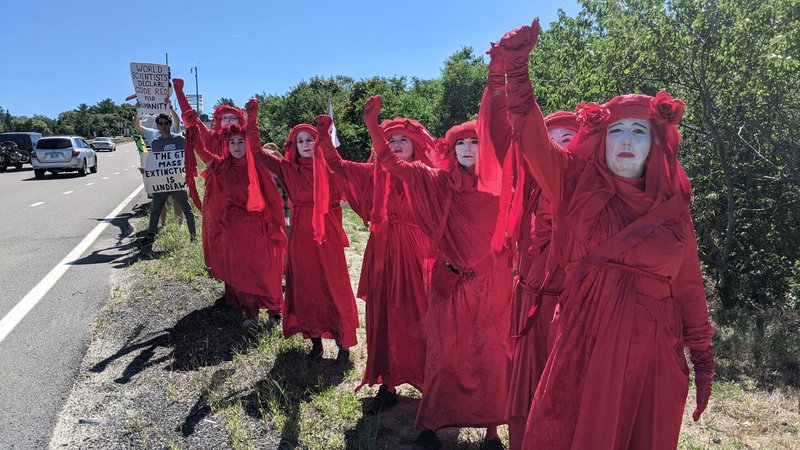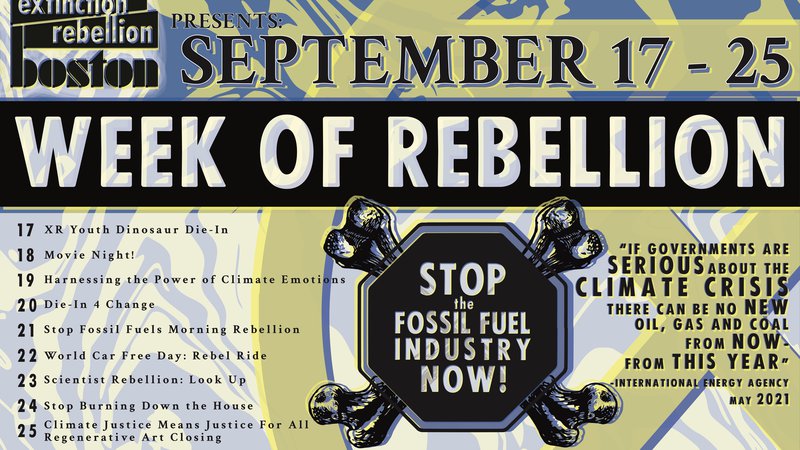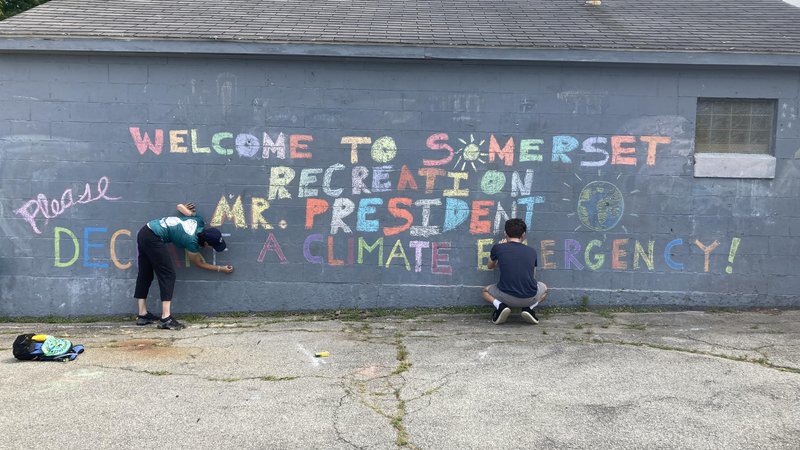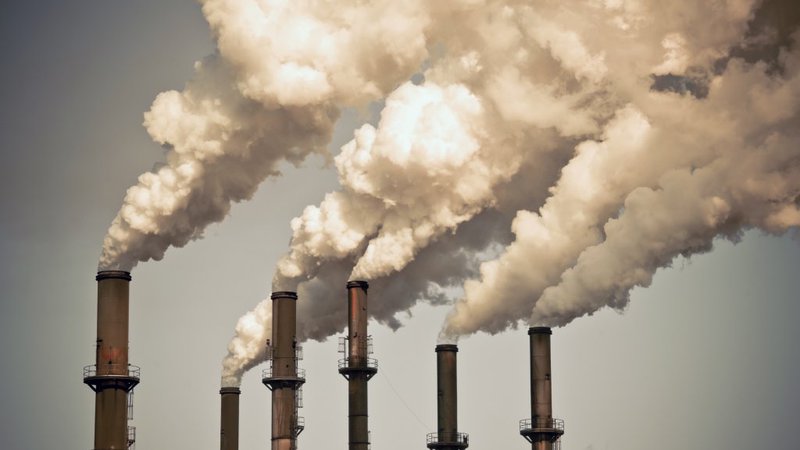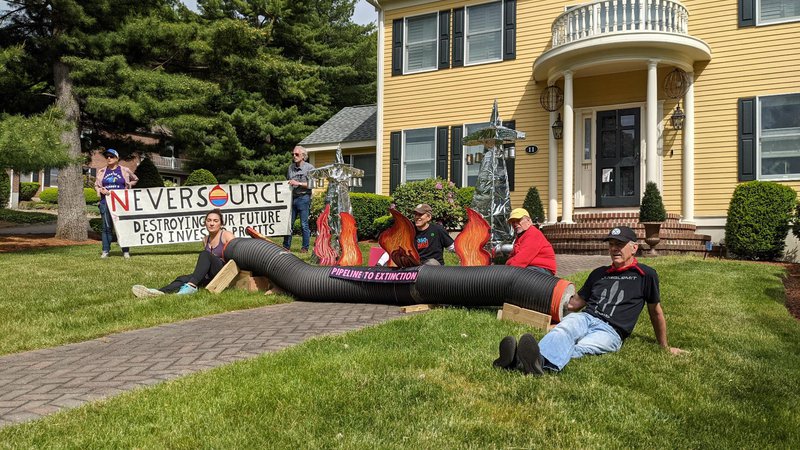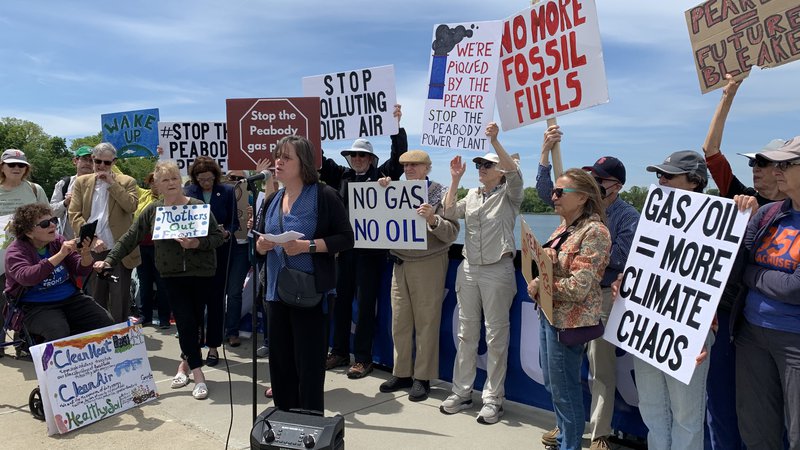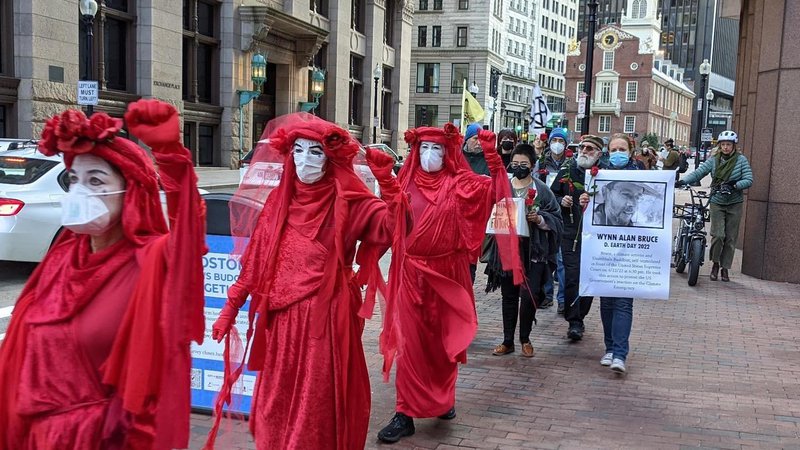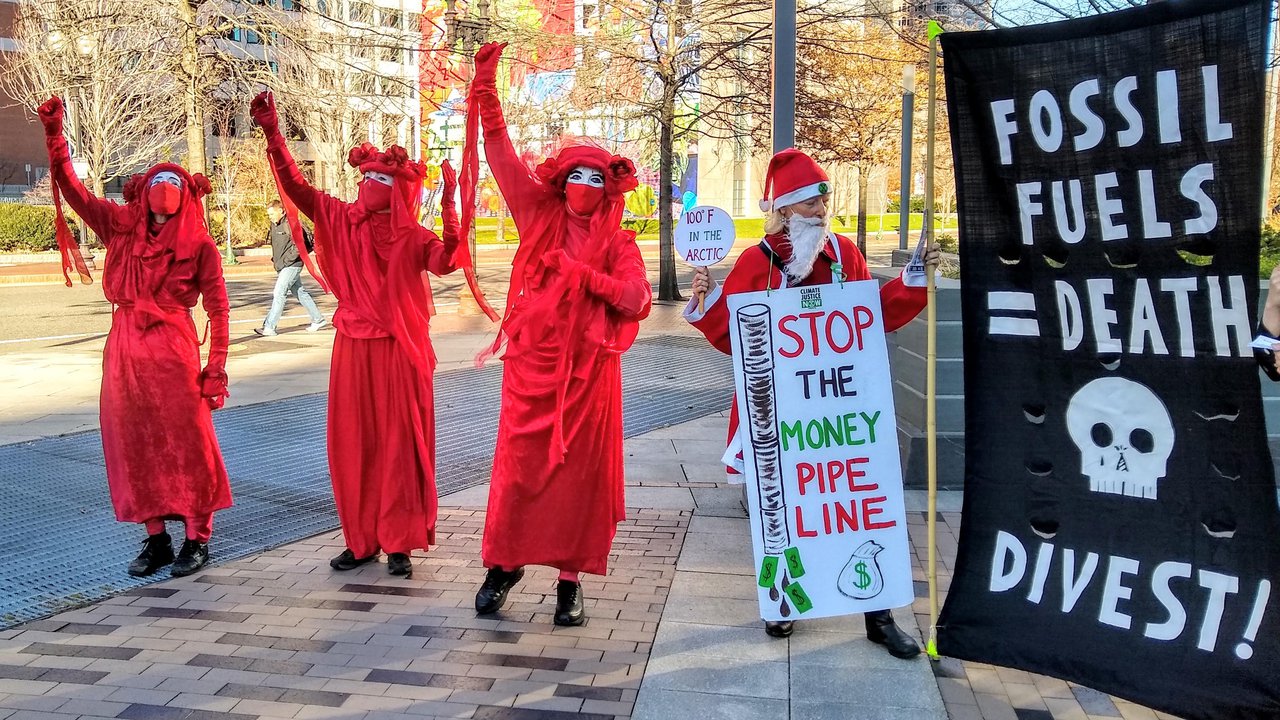
Climate Activists demand Federal Reserve to divest from fossil fuels
Climate Activists Demand Federal Reserve Bank to Divest from Fossil Fuel Investments
The Federal Reserve Bank is funding the climate crisis, financing extinction, and selling our futures to corrupt investments
BOSTON, MA — Climate justice activists from Extinction Rebellion Boston held a protest and put on street theater in front of the Federal Reserve Bank in Boston today. They demand that the Federal Reserve divest from fossil fuel investments.
Young activists held signs about what they want for their future: “A family, Stable food supplies, Natural world without disasters.” Activists playing financial tycoons dumped fake oil into their mouths and over their wishes for a happy and healthy future. As the young activists and their dreams “died” in front of the Federal Reserve, the scene was mourned by the Red Rebel Brigade, an artist troupe dressed in flowing red gowns that represent “the shared blood of all species.”
Banks that are funding fossil projects are using customer’s money to fund an industry that is endangering life on Earth. Continuing to burn fossil fuels will create more carbon emissions and the average global temperature will continue to rise. Rising temperatures will result in increasingly dangerous weather and ecological events. The climate crisis is already damaging our infrastructure and is extremely costly to our economy, and negative economic effects will accelerate as the climate and ecological crises worsen. [1,2]
“Banks funding fossil fuel projects are destroying Earth and leading us towards what climate scientists call an ‘uninhabitable hothouse Earth.’ [3,4] This needs to stop today. The Federal Reserve has a responsibility to protect banks and their customers from dangerous and financially risky investments,” said James Comiskey, member of Extinction Rebellion Boston, who was covered in oil by the end of the demonstration.
“Not only is investing in fossil fuels existentially destructive to the future of all people and species on this planet, but they are risky and will not survive as the world transitions towards a clean-energy economy. Any money invested in fossil fuels today is clearly done with heavy influence and corruption from fossil fuel interests in the pockets of our financial institutions,” said Susan Lemont of Extinction Rebellion Boston.
According to the annual “Banking on Climate Change Report” from the Rainforest Action Network, the top four funders of fossil fuels globally are U.S. banks. [5] Together, JP Morgan Chase, Citibank, Wells Fargo, and Bank of America spent $975 billion on fossil fuel projects between 2016 and 2020. JP Morgan Chase is the worst offender.
“That’s nearly a trillion dollars tied up in risky projects that are incompatible with the scientific targets in the Paris climate agreement and the pledges made by the United States and countries around the world,” said Senator Ed Markey recently in an article for the Boston Globe. “Our banking authority, the Federal Reserve, must take an active role in protecting the banking system, and all those who depend upon it, from financial risks fueled by climate change.” [2]
Markey also spoke specifically of Jerome Powell, the Federal Reserve Chair, “Unfortunately, the Federal Reserve chair, Jerome Powell, has not shown the necessary leadership in safeguarding our financial system from the risks of climate change…[he] is not the right Federal Reserve chair for this moment.” [2]
Despite the Federal Reserve’s responsibility in regulating banks that have tremendous investments in industries that destroy the planet, Powell has said “Today, climate change is not something we directly consider in monetary policy.” [2]
JP Morgan is the “#1 Worst Bank in the World for funding fossil fuel projects.” Chase has invested $268.593 billion into tar sands, arctic drilling, and fracking since 2016 - more than any other bank. They have steadily increased their funding of the fossil fuel industry since the Paris Climate Agreement. Since Trump took office, Chase has quadrupled its investments in tar sands oil and increased its financing of coal by over 2,000%. [5]
Scientists say that there is no more room for fossil fuels in Earth’s “carbon budget” if we are to limit climate change to a survivable degree, yet Chase and other banks around the globe continue to pour money into finding more fossil fuels.
According to Bill McKibben, author and founder of 350.org, "At this late date, it is simply nuts for banks to keep financing the ongoing destruction of the planet's climate. Bankers are acting as radical agents of physical and social chaos; it's time for them to pull back and pay attention to science and society.”
Climate scientists, virtually unanimously, predict catastrophic results from accumulated greenhouse gasses in the atmosphere. Earth is on track for several degrees of heating. Antarctic and Greenland ice sheets will melt, causing a sea level rise that will flood coastal cities, including large sections of Boston, Cambridge, and many other Massachusetts communities. [6] Hundreds of thousands of species are predicted to go extinct, devastating biodiversity and risking mass food shortages. [7,8] Deserts will expand and render large areas of the planet uninhabitable, forcing millions of climate refugees to migrate, disrupting societies and economies. [9,10,11]
The Federal Reserve has a responsibility to make decisions that protect citizens from economic risks and climate and ecological catastrophe resulting from the continued burning of fossil fuels.
- World economy set to lose up to 18% GDP from climate change if no action taken, reveals Swiss Re Institute's stress-test analysis | Swiss Re
- Federal Reserve’s Powell lacks leadership on climate change - The Boston Globe
- Trajectories of the Earth System in the Anthropocene
- Climate Change Threatens the World’s Food Supply, United Nations Warns - The New York Times (nytimes.com)
- Banking_on_Climate_Change__2020_vF.pdf (ran.org)
- Sea Level Rise Could Threaten 90,000 Homes In Mass., Study Finds | WBUR News
- Animal populations worldwide have declined nearly 70% in just 50 years, new report says - CBS News
- Climate change report: Human civilization at risk by 2050, according to new Australian climate change analysis - CBS News
- The climate disaster is here – this is what the future looks like | Environment | The Guardian
- Climate change: Heat 'nearly unlivable' for up to 3 billion by 2070 (usatoday.com)
- Intergovernmental Panel on Climate Change. 2014. Climate Change 2014: Synthesis Report. See also Bill McKibben. 2011. Eaarth: Making a Life on a Tough New Planet. New York: St. Martin's Griffin; Naomi Klein. 2014. This Changes Everything: Capitalism vs. The Climate. New York: Simon & Schuster; David Wallace-Wells. 2019. The Uninhabitable Earth: Life After Warming. New York: Tim Duggan Books.
Related Stories:
Featured:
-
The third annual Week of Rebellion is full of opportunities for celebration and action!
-
Our government had the opportunity to finally turn our state into a "climate leader," and they decided yet again to prioritize profits and political posturing over the well-being of residents.
-
Prominent climate scientists and activists demand immediate climate action in the United States.
-
Stop the Fossil Fuel Industry, Now: List of events for Extinction Rebellion Boston's September week of rebellion
-
A compilation of books, movies, articles, and ways to take action to protect Black lives
-
Nadia Colburn, PhD and member of Extinction Rebellion Media team, discusses how to talk about the climate and ecological crisis with family and friends.
Upcoming Events:
-
Sun Jul 13th @ 3:30 p.m.
-
Mon Jul 14th @ 6:30 p.m.
-
Tue Jul 15th @ 10 a.m.
